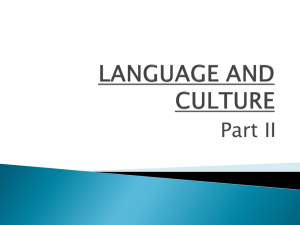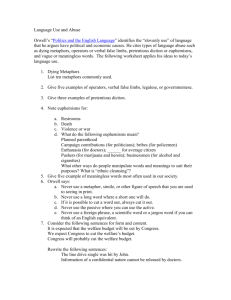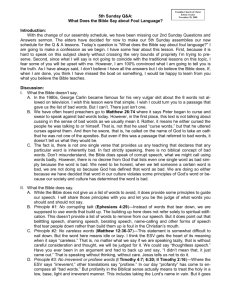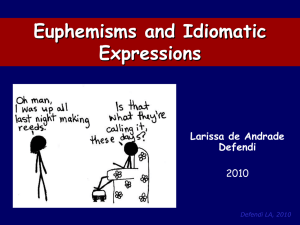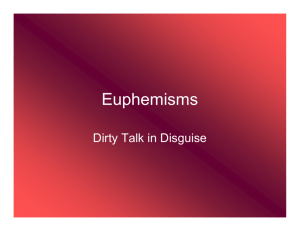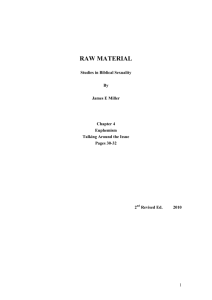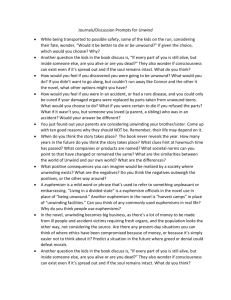The word 'euphemism' originally comes from Greek, with the prefix
advertisement
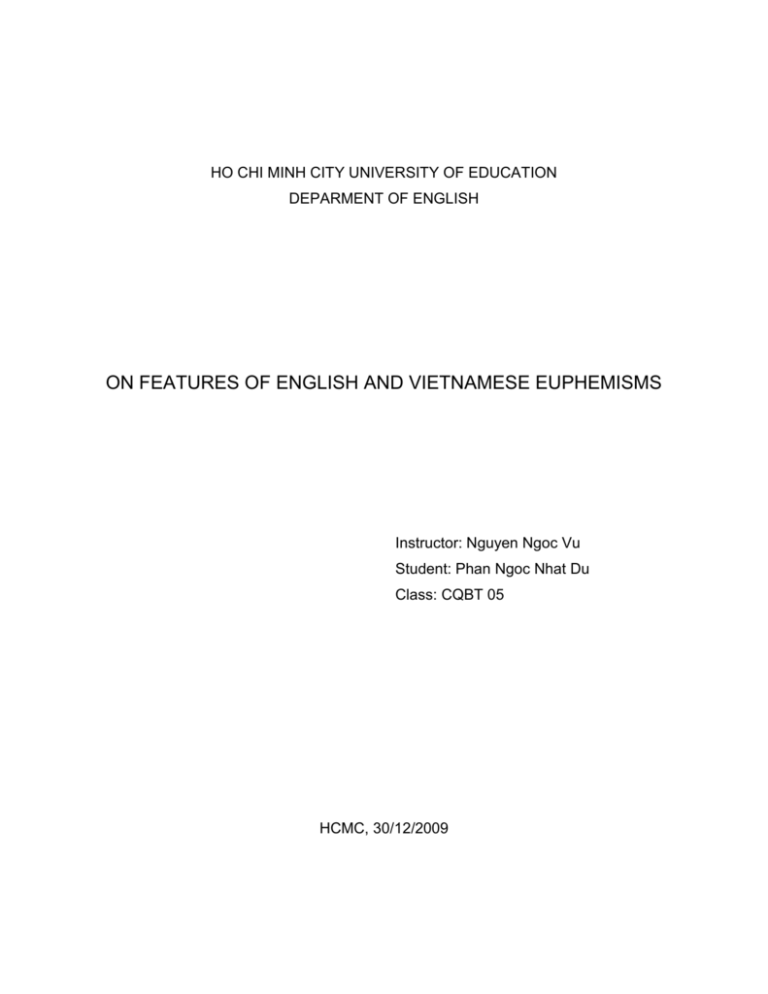
HO CHI MINH CITY UNIVERSITY OF EDUCATION DEPARMENT OF ENGLISH ON FEATURES OF ENGLISH AND VIETNAMESE EUPHEMISMS Instructor: Nguyen Ngoc Vu Student: Phan Ngoc Nhat Du Class: CQBT 05 HCMC, 30/12/2009 I. Introduction Language is the vehicle of communication of human beings. It is the bridge of all relationships of people on the planet. Euphemism, meanwhile, which is considered one of the useful ways in human communication is very common in each language. Robert Burchfield, the former editor of The Oxford English Dictionary, points out that “A language without euphemisms would be a defective instrument of communication.” (Eschholz et al., 2000:512). Then what is a euphemism? Through decades, people have ceaselessly enriched and diversified linguistics with many new concepts. Among them, the concept of using euphemisms becomes more and more common in present day language. In all societies and in certain circumstances, we can see that people may sometimes use some words but not others which are considered as taboos. The word “taboo” here was borrowed from Tongan, a Polynesian language, and in the society, it refers to the acts which are to be avoided. When an act is taboo, reference to this act may also become taboo. That is, first one is forbidden from doing something; then one is forbidden talking about it. Taboos are valuable as an index of the comfort or importance of a topic to a person or a culture. In other words, taboos are the ones that are not used, or at least, not to be used in the “polite society” because of being considered rude, vulgar, or in some cases too direct or indecent. So how can it be dealt with the issue of not using the words in the taboo list? It is the existence of taboo words and/or taboo ideas that stimulates the creation of euphemisms. The word “euphemism” originally comes from Greek, with the prefix “eu” meaning “good” and the root “phemism”meaning” “speech”. Therefore, the notion of euphemism refers to the “substitution of a mild or vague or roundabout expression for harsh or blunt or direct one”. As a part of the English language, euphemisms have been used widely and there seems to be a tendency for its popularity. In other words, “a euphemism is a word or phrase which replaces a taboo word, or which is used in the attempt to avoid either fearful or unpleasant topic” (Victoria Fromkin et al- An Introduction to Language, 2nd ed.) or “ a word or expression intended by the speaker to be less offensive or objectionable than what it replaces” (Steward L. Tubbs & Sylvia Moss – Human Communication, 7th ed. McGraw-Hill). In this essay, I’ll talk about the purpose of euphemisms. Next, I’m going to make my effort to do some research on various features of English and Vienamese in this area and have some opinions on similarity of both languages in funtions and differences in the degree of productivity of some aspects. Then some implications for language teaching are discussed. I hope that the information included in this paper will help to have a deeper look in the two language systems in euphemism, an interesting linguistic phenomenon. II. The purpose of euphemism Euphemisms are words we use to soften the reality of what we are communicating to a given listener or reader. They are a universal feature of language usage; all cultures typically use them to talk about things they find terrifying (e.g., war, sickness, death) because, anthropologically, "to speak a name was to evoke the divinity whose power then had to be confronted" (Neaman & Silver, 1983, pp. 1-2). Similarly, we use euphemisms to express taboos, as we feel, on some instinctual level, that the euphemism keeps us at safe distance from the taboo itself. Another use of euphemisms is to elevate the status of something (e.g., using educator for teacher, attorney for lawyer); but in general, we use euphemisms to express what is socially difficult to express in direct terms. III. Feature of English euphemisms 1. Universality Universality is something that is well-known and accepted by all of the people. Although euphemism is indirect and it doesn’t come straight to the point, people can easily infer its deeper implication. For example, some taboos connected with death, disease are replaced by euphemisms and the public has accepted this kind of use. In English, death has become a four-letter obscene word, which is not to be used when talking to people in normal daily polite conversations. The practice of using euphemisms for death is likely to have originated with the “magical” belief that to speak the word 'death' was to invite death (where to “draw Death's attention” is the ultimate bad-fortune -- a common theory holds that death is a taboo subject in most Englishspeaking cultures for precisely this reason). Therefore, people who have died referred to as having “passed away”, “fell asleep”, “deceased” or “departed’. People in English-speaking countries also have other euphemisms to deal with the subject of death, such as: “no longer with us, be no more, cease to breathe, cease to live, close one’s eyes, left us, lost, breathe one’s last, at someone’s final rest…” In addition to non-religious euphemism, there are lots of euphemisms which Christians often use to speak the word “death”. For them to die means: asleep with Jesus/Christ, fall asleep in the arms of Father, come to Jesus, departed to God, go home, called home, go to one’s last home, go to be with the Lord or called to higher service.... Here, death is regarded as being reunited with Father God or simply going home. In addition, euphemism for death is sometimes restricted by the context. For example, “On the 14th of March, at a quarter to three in the afternoon, the greatest living thinker ceased to think.” This sentence comes from Speech at the Graveside of Karl Marx. This example involves the passing away of a great man. And the phrase “ceased to think” echoes “thinker”. This euphemism produces a good effect. Disease is another fear of man. In primitive society, because medicine is not as advanced as now, people often die when they got sick. At that time, disease was as dreadful as death. Therefore, they didn’t speak it directly. Nowadays, although many diseases can be cured, people are still afraid of them. For this reason, people usually use euphemistic words when they mention the name of disease. For instance, the big C for cancer (in addition, some people whisper the word when they say it in public, and doctors euphemistically use technical terminology when discussing cancer in front of patients, e.g., “c.a.” or “neoplasia”/ “neoplastic process”, “carcinoma” for “tumor”); euphemisms for cancer are used even more so in the Netherlands, because the Dutch word for cancer can be used as a curse word.“Social disease” substituting “acquired immune deficiency syndrome”, and “dicky ticker” meaning“heart attack” are other examples illustrating for this feature of euphemism, not to mention the word “Special Clinics” some hospitals usually have, where sexually transmitted infections are treated. 2. Indirect and interrelated One of the essential aspects of euphemisms is to avoid mentioning some unpleasant phenomenon or arrangements directly. In another word, to mention these unpleasant indirectly or with a euphemistic way of speaking could be regarded as the soul of euphemism. Therefore, it is very obvious that indirect is the main feature of euphemism, and is as same as implicit. Interrelated, this feature reflects the formation of euphemism, that is, euphemism always gives people hints in a roundabout way. Though euphemism is indirect and it doesn’t come straight to the point, people can easily infer its deeper implication. Some taboos connected with sex are replaced by euphemisms.For instance, “Groin”, “crotch”, and loins” refer to a larger region of the body, but are euphemistic when used to refer to the genitals. The word “masturbate” is derived from Latin, the word “manus” meaning hand and the word “sturbar” meaning to defile. In pornographic stories, the words “rosebud” and “starfish” are often used as euphemisms for “anus”, generally in the context of anal sex. In addition, there are lots of euphemisms relating to sexual intercourse in English language. The “baseball metaphors for sex” are perhaps the most famous set of polite euphemisms for sex and relationship behavior in the U.S. The metaphors include terms like “hitting it off” for a good start to relationship, “striking out” for being unlucky with a love interest, and “running the bases”for progressing sexually in a relationship. The “bases” themselves, from first to third, stand for various levels of sexual activity from “kissing” to “petting”, itself a euphemism for manual genital stimulation, all of which is short of “scoring” or “coming home”. “Hitting a home run” describes sex during the first date, “batting both ways” (also “switch-hitting”) or “batting for the other team” describes bisexuality or homosexuality respectively, and “stealing bases” refers to initiating new levels of sexual contact without invitation. Baseball-related euphemisms also abound for the “equipment”; “Bat and balls” are a common reference to the male genitalia, while “glove” or “mitt” can refer to the female anatomy. Besides, English language also has other euphemisms for having intercoursewith: acting like rabbits, making love to, getting it on, cheeky time, doing it, making the beast with two backs, sleeping with, lay with or lie with, do, carnal knowledge, act of union, hook-up. Some above words even appear in some modern English songs. The popular song “Tonight I celebrate my love for you” by Peabo Bryson is a good example: “…Tonight no one’s gonna find us We’ll leave the world behind us When I make love to you Tonight I celebrate my love for you…” Euphemisms are also common in reference to sexual orientations and lifestyles. For example in the movie “Closer” the character played by Jude Law uses the euphemism “He valued his privacy” for being gay. Other common euphemisms include “a love of musical theatre, light in the loafers, good fashion sense or confirmed bachelor” for male homosexuality, “woman in sensible shoes” for lesbian, “gender reassignment” for sex change. Moreover, there are many euphemisms for birth control devices, sometimes even propagated by the manufacturers: Condoms are known as “rubbers”, “sheaths”, “love gloves”, “diving suits”, “raincoats”, “Johnnies” (in Ireland and to a lesser degree Britain) etc. The birth control pill is known simply as “The Pill”, and other methods of birth control are also given generalized euphemisms like “The Patch”, “The Sponge”, “Shots”, etc. There are also many euphemisms for menstruation, such as “having the painters in”, being “on the rag”, “flying the flag” (originally a euphemism for hanging out the bedsheet after a wedding night as a testament to the woman's virginity, or it simply being “that time of the month”. “Poor” is a typical example of this kind of feature. In English, “poor” is a fearful word, which means living a bad life, marks low position in society as well. Hence, such alternate words as needy, culturally deprived, underprivileged, and disadvantaged were used instead. The following description could show us a series of English Euphemism about poor: “I used to think I was poor. Then they told me I wasn’t poor, I was needy. Then they said it was self-defeating to think of myself as needy, that I was culturally deprived. Then they told me deprived was a bad image, that I was underprivileged. Then they told me that underprivileged was overused, that I was disadvantaged. I still don’t have a dime but I have a great vocabulary!”(Harper Dictionary of Contemporary Usage). According to the example, we could find out four euphemisms which have the same meaning as poor: needy, culturally deprived, disadvantaged, underprivileged. Another example I used to show this feature of euphemism is “old age”. Experiencing adult, middle age, old age and death is natural for everyone. However, to westerners, old age means worthless and the old will be looked down upon or even deserted. Therefore, nobody would like to admit that he is old. For this reason, they try their best to borrow other words to express it, including “the advanced in age”, “the mature”, “the longer living”, “seasoned man” and “senior citizens”. This indirect feature is also common in a lot of professions. “Many previously unwelcome professions have now taken more appealing names”. For example, sanitation engineer =janitor, transparent-wall maintenance officer = window cleaner, diamond cutter = lawn-mower, custodian = janitor, administrative assistant =secretary, rodent officer = rat-catcher, cemetery operative = gravedigger, civil service rat-catchers = environmental health officers. 3. Humorous feature Some euphemisms are intended to amuse. The use of euphemisms could increase the sense of humour of language, and make the conversation between people more interesting. For example, after having dinner, British always says to the hospitable host, “I’m willing, but Mary isn’t”. Here, stomach is personified as “Mary”, which is interesting and promoted friendship between the host and the guest. Another reason, “in the family way” and “have a bun in the oven”, these two words take place of the word “pregnant” which could make it less seriously. For this reason people often say: “She was in the family way, so they got married” or “Have you heard that Katy has a bun in the oven?” Furthermore, people also avoid mentioning some subjects considered personal and sensitive by name and instead use a “humorous expression”. For instance, when bathroom is referred in the conversation, people often use such humorous expressions as “He's in the bog”, “I'd like to pay a visit to the smallest room of the house”, “Where can I powder my nose?”, “He's gone to see a man about a dog.” Another example, when they want to say someone is unemployed, it is sensitive, so they often say that “He is between jobs at the moment” or “She is a resting actor” (only use for unemployed actors). To refer to death, some humorous euphemisms were used too. People can say about death in a humorous way like this: “I won’t worry about money when I’m six feet under”, or “when I’m in my box you can argue all you like about the inheritance”. 4. The feature of times Language could be changed because of the needs and development of the society. Therefore, epochal character could be also called changeable. From a historical point of view, language has been changing incessantly. New words appeared, and old words disappeared gradually. So are euphemisms. Consider the case of the word “black people”. At the very beginning, black people was called “negro”, then “black people”, but now, they are called “ African American”. This transition resulted from black people rights movement in America. We could also see this feature from the word “-gate”, a nickname construction that became popular in the aftermath of the Watergate scandal. This word appeared in 1972 which had great influence all over The US, even all over the world. Then “Watergate” is widely used to express different kinds of political events or public scandals. Nowadays, -gate seems to become suffix taking place of “affair” or “scandal”. For example, The Lewinsky scandal which was a political sex scandal emerging from sexual relationship between United States president Bill Clinton and a 22-year-old White House intern, Monica Lewinsky is sometimes reffered to as Monicagate, Lewinskygate, Tailgate, Sexgate, and Zippergate, to name but a few. Koreagate is also a good example of the appellation of “-gate”. It was an American political scandal in 1976 involving South Korean political figures seeking influence from ten Democratic members of Congress. IV. Features of Vietnamese euphemisms 1. Universality The Vietnamese language also contains numerous euphemisms related to dying or death, which are in common with the one in the English language. The aim of those words is to lessen the pain and sorrow of the deceased’s family, relatives and friends and to show sympathy for them. Vietnamese also use euphemistic expressions which have equivalences in the English language. Therefore, death only means: “về với tổ tiên, về với ông bà”. In Vietnamese, there are some other different euphemisms for death and dying, used in different context. For examples, the King’s death, Vietnamese say: băng hà. A Buddhist follower’s death, they say: “viên tịch, nhập niết bàn, về với Phật, giải thoát”. In the past, the word “khuất núi” was often used. It may refer to the image of the sun setting in the west, behind the mountain. People who died are also referred to as “bỏ (cha mẹ), tạ thế, đi, về, nhắm mắt xuôi tay, mãn cảnh trần, trăm tuổi, thọ chung, mệnh chung, rời bỏ cuộc đời, không ở với chúng ta nữa, vĩnh biệt rồi…” Vietnamese also use euphemistic expressions which have equivalences in the English language. However, such words are often among Vietnamese Christians: “ về với Chúa, lên thiên đàng, sang thế giới bên kia, ngã trong vòng tay của Chúa, rời bỏ thế giới này.” In Vietnamese literature, death or dying are replaced by other phrases being restricted by the context as is stated in following poems: “…Nữa chừng xuân thoắt gãy cành thiên hương….” (Truyện Kiều - Nguyễn Du) “… Thì đà trâm gãy bình rơi bao giờ…” (Truyện Kiều - Nguyễn Du) “ Bác Dương thôi đã thôi rồi…” (Khóc Dương Khuê - Nguyễn Khuyến) “…Bác đã lên đường theo tổ tiên…” (Bác ơi - Tố Hữu) 2. Indirect and interrelated Some taboos connected with sexual intercourse are also replaced by euphemisms. However, Vietnamese language has fewer euphemisms for this appellation compared with English. For example, “đời sống vợ chồng”, “sinh hoạt vợ chồng”, “sinh hoạt chăn gối” for couple are spouses. For those who are not husband and wife, Vietnamese people uaually say: “sống với nhau, sống như vợ chồng, sống với nhau như vợ chồng, vượt rào, ngủ (với nhau), ăn nằm, ăn ngủ, ăn cơm trước kẻng, qua đêm (với nhau)”. Euphemisms for having sexual intercourse were even used in old poems, for example, Truyện Kiều by nguyễn Du: “Tiếc thay một đóa trà my Con ong đã tỏ đương đi lối về” Or in the story Chí Phèo by Nam Cao: “Chúng đã ăn nằm với nhau như vợ chồng” Like in English, there are also many euphemisms for menstruation in Vietnamese, such as “đến tháng”, “kẹt”, “đèn đỏ”, “có chuyện”, “bị”, “ngày phụ nữ”. Unlike English, using euphemisms in reference to sexual orientations and lifestyles is not common in Vietnamese. There are few substitutions for gay: “bóng, pê, hai-fai (hi-fi)”. So is lesbian. There has been a euphemism replacing this word known well until now: “ô môi.” Euphemisms for birth control devices are sometimes called “áo mưa”, “dụng cụ bảo vệ”, “phương pháp phòng tránh hiệu quả”. In short, for Vietnam’s is the Eastern culture, its people don’t feel free to talk about uncomfortable subjects connected with sexual intercourse, sexual orientations and lifestyles or birth control devices. However, Vienamese, unlike English speaking people, don’t feel that “poor” is a fearful word because of the financial status of their country. Thus, students always learn at school that “Vietnam is a poor country which has just recovered after war”. Besides, “poor”often appears in small talk, or even official documents. For example, in the certification of poor families (sổ hộ nghèo), it is exactly written that “poor family”, and which family has this will get some help from the government. Another thing I want to compare between English and Vienamese euphemisms is the word “old age”. For Vietnamese, experiencing adult, middle age, old age and death is natural for everyone. Therefore, the old feel proud if he is old or very old, not mention the overuse of this word “I’m old, not young.” (Tôi đã già rồi, đâu còn trẻ trung gì nữa.) in everyday talk of the middle-age and the young. There are not many borrowed words for this as a result. Although Vietnamese people usually say “every profession is noble”, there is discrimination between professions. Compared with mental work, physical labor is regarded as humble and inferior, in order to reduce the uncomfortable, people always use euphemistic ways to describe such jobs. “Many previously unwelcome professions have now taken more appealing names”. For example, “nhân viên chỉnh sửa tóc, người làm đẹp” = “người thợ cắt tóc”, “nhà báo” = “người không có việc làm”, “nhân viên vệ sinh” = “người làm công việc quét rác”, “lao công, tạp vụ”= “người làm công việc dọn dẹp”. 3. Humorous feature Vietnamese usually use euphemisms to increase the sense of humor of language too. The aim of these words is to make the conversation between people more interesting. For example, parents often talk about their daughter as “a timed bomb” (bom hẹn giờ). It means that they are worried about their daughter more than son. Sometimes those words related jobs are focused in a very funny way. For instance, we can hear someone answering the question “What are you doing?” like this: “Tôi làm nghề phó đẽo.” (I’m a carpenter) “Tôi làm ngề phó gõ.” (I’m a typewriter) “Tôi là giáo viên.” (I’m a teacher) “Tôi làm nghề gõ đầu trẻ.” (I’m a teacher) In the Vietnamese language, there is also a long list of humorous euphemisms for death or dying, which are in common with the one in the English language. For example: “ ngủm củ tỏi, ngoẻo, nghoẻo củ tử, hai năm mươi, ngủ với giun….” 4. Feature of times Euphemisms in Vietnamese have also been changed because of the needs and development of the society. The word “băng hà” (to die) is an obvious example of this feature. This word was used to inform King’s death. Hovever, since there wasn’t King in Vietnam anymore, this word hasn’t been used in Vietnamese society as well. It just exits in the history and fairy stories, not mention to the words such as In football fields, new euphemisms appear, for example, chân sút vàng, quả bóng vàng, cầu thủ vàng, chân sút cự phách and substitute “a very good footballer”. Within this paper, I would like to discuss the similarity between English and Vietnamese euphemisms in functions and the difference the degree of productivity in some aspects due to culture of each country. Firstly, it is easy to recognize that English and Vietnamese euphemisms are words or series of words which replaces unpleasant or shocking ideas with softer and nicer expressions, suggest something unpleasant to the listener, or to make it less troublesome for the speaker. In addition, speakers also avoid mentioning some subjects considered personal, sensitive or taboo by name and instead use a “euphemism”. Using euphemisms in both of above languages is for humorous purposes and to enable public discussion of otherwise taboo topics as well. Secondly, I find that there are differences between two languages in the degree of productivity of euphemisms in some aspects, mainly owing to the different culture. Language, in Xing Fuyi view’s, is the symbol of culture, while culture is the track of language (Xing Fuyi, 1990). The culture of a nation can be reflected in its language. So are euphemisms. Therefore, in Vietnam, some sensitive subjects connected with sex or sexual relationship and orientations are seldom told much. That’s the reason why euphemisms in this aspect are not as productive as those in English. Through a contrastive view into Vietnamese and English euphemisms in two aspects as mention above, I would like to discuss some implications for English and Vietnamese teaching at high school in our country: The English language is becoming more and more euphemistically complicated every day. Using euphemisms to express any number of everyday realities in the workplace, the business world, the mass media, etc is increasing constantly as Bryan A. Garner states euphemisms “thrive as much today as ever.” Hence, failing to understand euphemisms leaves students vulnerable to manipulation and exploitation by language. In addition, fluency in English cannot be achieved without a reasonable command of them, and a great number are semantically opaque. For learners, euphemisms represent a part of English largely untaught. Thus, students often struggle to internalize the social codes of conduct that fuel the need for euphemisms; therefore, they find it very challenging to use them effectively. This is particularly problematic because the English language fluency requires users to master this skill as well. Therefore, as a future-to-be teacher, I believe that teachers should keep in mind that euphemisms are also an important aspect needed to be focussed on. Euphemisms can be designed as warm-up, review activities or homework after class. For example, to begin the lesson, the teacher explains that English, like all languages, has subjects that can be difficult to talk about, because the original words for these subjects can offend, disturb, or embarrass the person one is addressing. State that for these subjects we use words called euphemisms, which are “softer” words than the original words. For example, mention that death is often talked about with euphemisms such as pass away, pass on, go to heaven, etc. Then, the teacher writes on the board “poor, fat, and old” and state that these words are often euphemized in English. Ask students if they know any euphemisms for them. (Possible answers might be, respectively, low-income, working class, modest; overweight, stout, portly, husky; senior, mature, traditional.) As students offer euphemisms, write them on the board. Alternatively, the teacher can write the following sentences (or similar ones) on the board “They are now at their final rest (They died) /She was less favoured by beauty (She was ugly or unattractive)” and tell students to “translate” each sentence into clear, straightforward English. One more way is that each student can be asked to find a newspaper article that uses at least five euphemisms and replaces them with more direct English words. The students bring in the original article (perhaps taped or pasted to a sheet of paper) with the euphemisms underlined and their “translations” written on the paper. This is one the interesting kinds of homework for student. In these cases, contrastive knowledge in students’ mother tongue and the target language somehow also gives students a clear distinction in order not to make misunderstanding transference. In conclusion, euphemism is an appropriate language form created by people to achieve an ideal communicative effect in the social interactions. Enrighr D.J. stated that “If euphemism doesn’t exist, the movement of the world will stop and it will be filled with hatred.”Euphemism develops while the society develops. If we make good use of this language form, it will accelerate and facilitate human communication. People’s interpersonal relations will be more harmonious. We can make full use of euphemism and make our life more colorful.That is the reason why I believe that a contrastive analysis in this area between English and Vietnamese is necessary and interesting. Obviously, it shows features of English and Vietnamese euphemisms, then points out some similarities and differences between them in some special aspects Moreover, the studies also suggest some implications for teaching English for high school students.I hope that this paper, to a certain extent, will help much for further exploration in this area and provide language teachers some idea for their teaching. REFERENCES CITED Burchfield, R. (2000). In P. Eschholz, A. Rosa, V. Clark (Eds.). Language awareness: Readings for college writers (p. 512). Boston: Bedford/St. Martin's. Fromkin, V., Rodman, R., & Hyams, N. (2007). An Introduction to Language (8th ed.). Boston, MA: Thomson Wadsworth. Steward L. Tubbs & Sylvia Moss. Human Communication. McGraw-Hill Nguyễn Thiện Giáp. (1998). Từ vựng học Tiếng Việt. Vietnam: Hanoi City. Nguyễn Văn Tu. (1976). Từ và vốn từ vựng Tiếng Việt hiện đại. Vietnam: Hanoi City. Đặng Đình Thiện. Contrastive Analysis: Euphemisms in English and Vietnamese with DEATH as examples. Nov 10, 2009, from On Features of English Euphemisms. Nov 21,2009, from www.docstoc.com A study on English Euphemisms. Nov 21,2009, from www.oppapers.com Judith S. Neaman, Carole G. Silver. (1995).The wordsworth book euphemism. Wordsworth Editions Ltd Vũ Xuân Thái. (1998). Gốc và nghĩa từ Việt thông dụng. Vietnam: Hochiminh City. Đỗ Hữu Châu. (2004). Giáo trình từ vựng học Tiếng Việt. Vietnam: University of Education. Đỗ Hữu Châu. (1981). Từ vựng ngữ nghĩa Tiếng Việt. Vietnam: University of Education. English euphemisms. Dec 5, 2009, from en.wikipedia.org Euphemism. Nov 17, 2009, from en.wikipedia.org What is a euphemism? Nov 17, 2009, from en.wikipedia.org Ngyuễn Văn khang. (2001). Tiếng lóng Việt Nam. Vietnam: Hanoi City. Garner, B. A. (1998). A dictionary of modern American usage. New York: Oxford University Press, Inc. William and Marry Morris. (1988).Harper Dictionary of Contemporary Usage.New York: Harper and Row. Xing Fuyi. (1990). Cultural Linguistics. Hubei Education Press.

